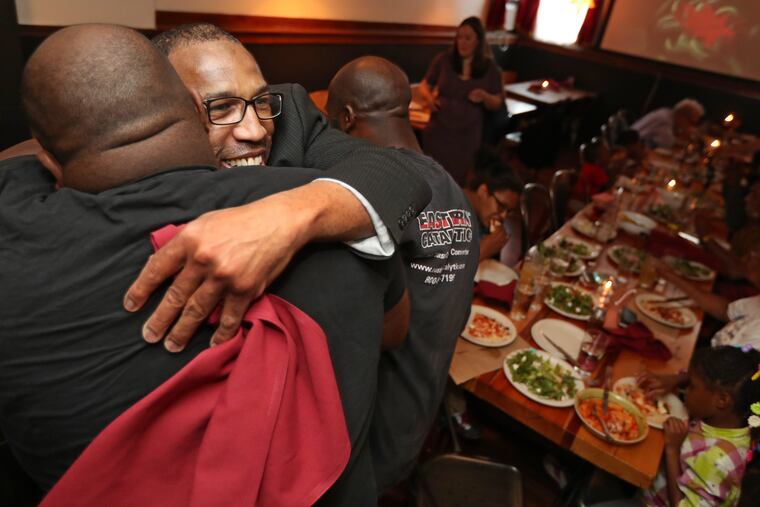Philly man, wrongly imprisoned for 25 years, gets nearly $10 million from city
Anthony Wright, the Philadelphia man who served nearly 25 years of a life-without-parole sentence for a 1991 rape and murder that DNA evidence decades later proved he did not commit, on Wednesday received a $10 million out-of-court settlement from the city, the largest wrongful-conviction payout in Philadelphia history.

Anthony Wright, the Philadelphia man who served nearly 25 years of a life-without-parole sentence for a 1991 rape and murder that DNA evidence decades later proved he did not commit, on Wednesday received a nearly $10 million settlement from the city, the largest wrongful-conviction payout in Philadelphia history.
The $9.85 million payment to Wright, 46, is more than double the largest previous payout by the city, of $4.4 million made in January 2017 to college student and food deliveryman Philippe Holland. He was shot multiple times by two plainclothes police officers after he had dropped off a cheeseburger at a West Philadelphia home in 2014.
Last month, Philadelphia Police Officer Ryan Waltman was found liable for $10 million in the 2011 arrest of a city man he accused of pointing a gun at him and who spent three years in jail before being found not guilty by a jury. Because that verdict was not against the city, the eventual payout to the victim, Khanefah Boozer, is expected to be significantly smaller.
Wright's case underscores how important DNA evidence is in criminal prosecutions. Statistics from the Innocence Project, whose lawyers were on Wright's legal team, show that since 1989, DNA evidence has led to exoneration of 356 people serving prison terms in the United States.
In August 2016, with the DNA evidence on his side, Wright was retried in Common Pleas Court and was found not guilty by a jury whose members later expressed disgust with the District Attorney's Office for retrying the case in the face of evidence that proved Wright was not guilty of raping and killing Louise Talley inside her Nicetown home.
DNA tests showed that sperm found inside Talley's body belonged to Ronnie Byrd, a former Nicetown crack addict who died in a South Carolina prison at age 62. The testing also proved that only Talley's DNA was inside clothing that homicide detectives say Wright told them he wore and that was found inside his bedroom in his mother's Nicetown house.
The settlement is a fair resolution to a "tragic case," Mayor Kenney said in a statement Wednesday. "Mr. Wright has shown great dignity throughout this process, and I hope this resolution assists him and his family after what they have been through."
Wright expressed satisfaction with the outcome of the case.
"Although I will never get over the 25 years I spent in prison for crimes I did not commit, or missing time with my mother before she died or with my son the whole time he was growing up, I am relieved that I can now get on with my life," he said in a statement. "For the sake of my young grandchildren, I am encouraged that the City of Philadelphia will continue to take steps to make sure that what happened to me never happens to my grandchildren or any other child."
A spokesman for District Attorney Larry Krasner, who took office in January, said the DA believes the decision to retry Wright "was unacceptable."
"It is not a case that the current office would have retried," Ben Waxman said. "The city's decision to be accountable for law enforcement misconduct while protecting public funds is commendable."
Peter Neufeld, one of Wright's attorneys and a founder of the Innocence Project, said: "Tony Wright, an innocent man, wrongfully charged and convicted, narrowly escaped execution when a divided jury declined to impose the death penalty. Mr. Wright maintained his innocence for 25 years and fought in the courts … to win the right to DNA testing. His steadfastness, his grace under fire, inspire us all."
The settlement does not include an admission of liability and will be paid over time: $4 million by June 30; $3 million by Aug. 30; and $2.85 million by Aug. 30, 2019.
After the 2016 retrial ended in a not guilty verdict, jurors said they were disappointed that city prosecutors had decided in 2014 to retry the case.
"I'm angry," Grace Greco, the jury forewoman, said after leaving the courtroom then. "The evidence was there that he did not commit this crime. The city should never have brought this case."
In the more than a quarter-century since Wright was imprisoned, the city Police Department "has seen tremendous reforms," Police Commissioner Richard Ross said in a statement. He noted that advancements have been made in the area of forensic science and in investigative and interrogation procedures, including the videotaping of interrogations.
Manuel Santiago and Martin Devlin, the now-retired homicide detectives who interrogated Wright and got him to sign a confession, have denied wrongdoing in their handling of the investigation.
Wright, who testified at both trials, denied confessing to the rape and murder. The seventh-grade dropout said he was berated by the detectives for about four hours before he signed the statement without reading it.
In addition to Wright's alleged confession, city prosecutors relied on statements by five witnesses, four of whom testified at the original 1993 trial.
Two of the witnesses had died by the 2016 retrial — their testimony was read to the new jury — and the remaining three recanted their statements that they had seen Wright going into Talley's house.